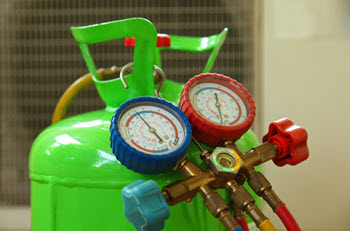Does Your AC Use R-22? Here’s What You Need To Know
 Most would agree that a central cooling system in any home is an unsung hero in maintaining comfortable temperatures during those sweltering hot and humid summer days. What happens if the system breaks down over the summer and your home’s AC system is over 15 years old? You have a big decision to make — Should you repair the older system or replace it? This is a common question for anyone who faces a major AC repair bill. However, many will also have to consider what type of refrigerant their air conditioner uses to make a wise decision.
Most would agree that a central cooling system in any home is an unsung hero in maintaining comfortable temperatures during those sweltering hot and humid summer days. What happens if the system breaks down over the summer and your home’s AC system is over 15 years old? You have a big decision to make — Should you repair the older system or replace it? This is a common question for anyone who faces a major AC repair bill. However, many will also have to consider what type of refrigerant their air conditioner uses to make a wise decision.
One aspect to consider is the US Government’s order to phase out the older refrigerant known as R-22. This phase-out began in 2010 and it finished its final stage on January 1, 2020, making it illegal to produce or import the substance. So, what is the best decision for a homeowner who has an older air conditioning unit that runs on R-22? Keep reading to find out more.
When Does R-22 Become Completely Banned In The United States?
Contents
- 1 When Does R-22 Become Completely Banned In The United States?
- 2 Can We Still Get R-22 Refrigerant In New Jersey?
- 3 Why Have They Banned R-22? The Damage To The Environment Caused By R-22
- 4 R22 Vs. R410a Refrigerants: Energy Efficiency & Comparison
- 5 R22 Refrigerant Cost Per Pound In 2021 – What’s The Deal With R-22 Refrigerant Prices?
- 6 Tax Credits And AC Savings
- 7 Conclusion
January 1, 2020 was the deadline for the production and importation of the refrigerant called R-22. For numerous years, it was popular, especially since it was able to be used with HVAC systems. It could extract hot air from inside and pump it outdoors. However, numerous studies proved how harmful it was to the environment. As such, the government issued strict regulations that caused the HVAC industry to develop better units and more environmentally friendly refrigerants.
Can We Still Get R-22 Refrigerant In New Jersey?
Currently, it’s still available. However, its cost has risen tremendously because of the cease of production and significant demand. For some, the price has soared to as much as $2000 just for a recharge on the home’s central air-conditioning system! For larger air conditioners, then it will be even more expensive to recharge it. This dilemma has led to smart homeowners to compare these exorbitant costs that come with deteriorating, older central AC units with modern more efficient systems.
Don’t delay, call McAllister Energy today for a free assessment of your home’s cooling system.
Should your air conditioner need a recharge this season or after, you will have no alternative other than to pay the astronomical R22 refrigerant costs or replace the HVAC system. Since your system is already on its last leg, y0u should be smart and place your hard-earned money on a new system that will give you a higher level of efficiency and comfort. Take advantage of the more competitive prices of a new AC unit if your home has a cooling system that is more than 15 years old.
Why Have They Banned R-22? The Damage To The Environment Caused By R-22
 It was discovered that the substance that helps cool our homes, R-22, has been harmful to the environment. It contains HCFCs[1] that, over time, destroyed our ozone layer. We cannot survive without this protective shield as we would end up becoming extremely vulnerable to the dangerous ultraviolet radiation from the sun.
It was discovered that the substance that helps cool our homes, R-22, has been harmful to the environment. It contains HCFCs[1] that, over time, destroyed our ozone layer. We cannot survive without this protective shield as we would end up becoming extremely vulnerable to the dangerous ultraviolet radiation from the sun.
Thankfully, upon discovery that this substance was harming the environment, steps were taken to ban HCFCs and other ozone-depleting substances around the world.[2] The large hole has shrunk over the years. It’s good to consider that you can do good for the environment by switching to a newer system that relies on a safer refrigerant known as Puron (R-410a).
R22 Vs. R410a Refrigerants: Energy Efficiency & Comparison
What Are The Differences Between Refrigerant R-22 & R-410a?
Over time, HVAC systems deteriorate in efficiency. With dust and debris accumulating on its surface, it will become affected by them. Additionally, there is wear and tear due to friction. Moreover, pressure building up over time could lead to leaks and cracks in the system. Sure, older units can still maintain cool temperatures in a home, but they will do so using a greater amount of power. This aspect is especially true in comparison to the first years of their service life. Essentially, that means you’ll be spending more to cool your home. So, it may be more logical and financially sensible to invest in a newer, high-efficiency system that will also reduce your energy bills.
Over the years, technology has dramatically improved heating and cooling equipment so that they are more energy-efficient. For example, compared to equal units, one from 2005 and a newer AC system made in the last year, the latter is a far superior unit. When you take efficiency degradation because of age, as well as normal wear and tear, the modern system would be more economically sensible.
R22 Refrigerant Cost Per Pound In 2021 – What’s The Deal With R-22 Refrigerant Prices?
 As mentioned above, R-22 refrigerant is still available. However, the limitation in supply is making it more and more expensive to purchase. Manufacturers were discouraged from making more of the refrigerant because of the phaseout even before the deadline of January 1, 2020. So, it has rendered it in high demand because there is such little supply, continuously increasing its price. It will continue to increase as supplies become more limited.
As mentioned above, R-22 refrigerant is still available. However, the limitation in supply is making it more and more expensive to purchase. Manufacturers were discouraged from making more of the refrigerant because of the phaseout even before the deadline of January 1, 2020. So, it has rendered it in high demand because there is such little supply, continuously increasing its price. It will continue to increase as supplies become more limited.
So, hypothetically speaking, if an older AC system is leaking or its refrigerant is below critical levels, homeowners will have to pay a huge price to repair their air conditioner this summer. The later the repair, the higher the cost of r22 refrigerant. Industry leaders anticipate that R-22 refrigerant price to increase steadily with the progression of the summer season and the scarcity of the substance.
Tax Credits And AC Savings
Property owners have been given some government incentives to switch from their older cooling systems to newer ones. As such, consumers have been offered several tax breaks so that they can make the investment. You can learn more about the computations from the Air Conditioning Contractors of America, or the ACCA.
When upgrading an air-conditioning system, its savings are linked to what we call SEER, for short. When these ratings are higher, consumers can benefit from a higher level of savings, whether they are incentives, rebates, or tax credits. So, homeowners who make the investment to upgrade their central air-conditioning system will get price breaks and increased efficiency which would ultimately reduce operational costs when it comes to cooling the home.
One could consider the SEER system rating similar to how many miles per gallon a car gets. Today’s best air conditioners use 30% to 50% less energy to produce the same amount of cooling as air conditioners made in the mid-1970s. Even if your air conditioner is only 10 years old, you may save 20% to 40% of your cooling energy costs by replacing it with a newer, more efficient model.[3]
For more details regarding tax breaks in your city or for more savings with HVAC upgrades in New Jersey, contact us now. Schedule your free HVAC assessment today by calling (856) 665-4545.
Conclusion
McAllister Energy, a reputable HVAC company, is proud to provide affordable services for commercial and residential properties in the area. We offer exceptional HVAC services, and all of the work that we perform is guaranteed. You can call us when your heating or cooling system requires a tuneup, installation, repair, or other maintenance tasks.
We aim to outshine our competition with our affordable prices, friendly service, and superior workmanship.
Contact McAllister Energy now to learn more about the services that we offer. No matter what concerns you may have about your cooling issues, we will help you find the best solution. If you have questions, we’ll have the answers. So, call us now!
Call us today, so that we can help you with all of your home HVAC needs. We offer in-home free estimates. To learn more, call us at (856) 665-4545 or click here to get in touch with us.
[1] Phaseout of Ozone-Depleting Substances (ODS) (https://www.epa.gov/ods-phaseout)
[2] Ozone depletion, explained (https://www.nationalgeographic.com/environment/global-warming/ozone-depletion/)
[3] US Department of Energy (https://www.energy.gov/energysaver/central-air-conditioning)
